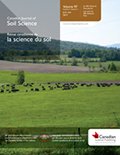Soil Science Education for Grades K-12 in Canada

By Doug Hayhoe, Jane MacIntyre, Shawn Bullock
View profile for:
Soil scientists who interact with K–12 students or teachers may benefit from knowing what the provincial curricula say, what a typical classroom teacher knows, and what resources, programs, and opportunities are available regarding soil education.
Many provinces have a soil science unit at the Grade 2–4 level in their curriculum. In all provincial curricula, soil science concepts are found in units on living things, plants, and ecosystems, from Grades 1–12. Even in kindergarten, hands-on soil programs effectively address many skills and attitudes’ expectations in the provincial curricula.
What is the use of having soil science in the curriculum, however, if the teachers responsible for student learning do not understand the key concepts? Preliminary results using a 25-item soil questionnaire show that incoming preservice teachers do have some initial understanding of soil, scoring 50% on a pretest application, when a random score would be 25%. After engaging in several hours of hands-on learning, followed by a wait time of several months, they then scored at 68%, thus gaining one third of what was lacking in their understanding. This may encourage those involved with soil education outreach to teachers.
Resources for teaching hands-on soil science to elementary students will be noted, including an integrated science-language method called “Soil Science through Stories”. At the secondary level, we have the national “Soil 4 Youth” program, which integrates soil science into school programs across Canada and is supported by the Canadian Society for Soil Science. New STEM (science, technology, engineering, and mathematics) approaches to education also offer opportunities for innovative teaching of soil science to Canadian students.
Article in Canadian Journal of Soil Science
Volume #: 96
Issue #: 3
Pages: 336-345
Publisher: Canadian Science Publishing
Year: 2016